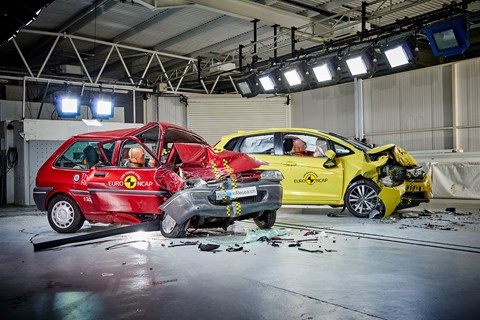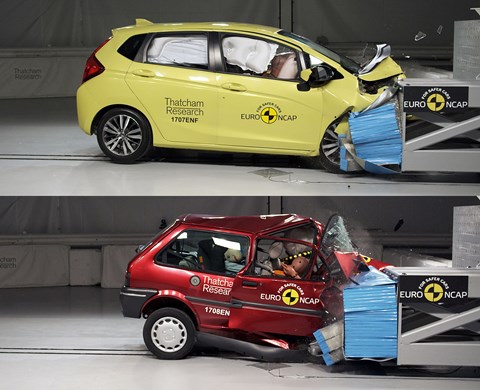► 20 years of Euro NCAP crash tests
► 1997 Rover 100 crash test on video
► Compare with a modern Honda Jazz
Euro NCAP has arguably done more to improve the safety of modern European cars than anyone else.
Through cajoling manufacturers, shaming the sinners – remember the crumpling Chrysler Voyager? – and promoting the winners, it’s done an impressive job of raising the protection offered by the cars we drive.
Crashfest! Celebrating 20 years of Euro NCAP
How else to celebrate two decades of saving lives than to hold an eye-grabbing crash test demonstration using two polar opposites?
Step forwards a Rover 100 from 1997, the year Euro NCAP kicked off. It was subjected to a 40mph offset frontal impact – with terrifying results. You can see the brutal truth of just how weak a 20-year-old Rover supermini was in the video above.

It folds in half, offering passengers next to no protection. Unsurprisingly, it scored a meagre one-star rating at the time, explaining its demise in the dying days of the MG Rover empire.
Step forward, a modern Honda Jazz
To show the progress made by car makers, Euro NCAP partner Thatcham Research then subjected a contemporary (well, 2015) Honda Jazz to the same crash test.
‘Wherever you were sitting in the Rover 100 it was bad news,’ said Matthew Avery, director of research at Thatcham Research. ‘In a head-on crash at 40mph, you definitely do not walk away. And you have a very high likelihood that you are no longer with us.
‘These crashes demonstrate how incredibly far we have come in 20 years and show why we have seen a 63% reduction in car occupant deaths and injuries since 1997, when Euro NCAP began.’
Click here for more motoring news
